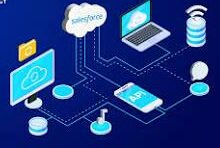Introducing Salesforce Integration – Fundamental Concepts
Before diving deep into more the complex aspects, let’s explore the basics of Salesforce Integrations, encompassing three key areas: integration types, integration capabilities, and integration patterns.
When we talk about integration, it means to create a connection between a specific Salesforce instance and another database, third party product, or system. The connection can be inbound, outbound, or bi-directional, and you may be connecting to another database, another Salesforce instance, or another cloud-based data source.
What is Integration?
Salesforce Integration involves bringing together two or more systems to streamline distinct processes, enabling the efficient management of information across various business processes that span multiple systems. Salesforce Integration is a process of connecting two or more applications. This provides both a sharing of data between systems and end user improved efficiency. Enterprise systems use many applications, many or most of which are not designed to work with one another out of the box.
How many integrations does Salesforce have? Salesforce has over 3,000 integrations available on its AppExchange marketplace alone. Apart from those, you can use: low-code and no-code integrations like Coupler.io or Zapier for data automation.

Why is Integration Important with Salesforce?
In our digital era, enhancing efficiency and customer experience is crucial for competitiveness and user adoption. Integration ensures that systems work seamlessly together by fostering a scalable and faster collaborative environment.
How do you make Salesforce even better? Integrate it with the apps you already use. From productivity to marketing to collaboration and beyond, now you can connect your Salesforce to the other tools you need to run your business. MuleSoft is Salesforce’s integration and automation technology and offers connectivity solutions for all of your apps.
What is an API?
API, or Application Programming Interface, facilitates communication between two applications. It enables the smooth exchange of data, ensuring processes occur without interruptions. Different API types will be covered in the ‘Salesforce Integration Capabilities’ section.

Types of Salesforce Integration Architectures
Three integration architectures come with both their benefits and drawbacks:
- Point-to-Point Integration:
- Also known as one-to-one integration.
- Involves sending messages separately to different systems.
- Has drawbacks, including high costs and maintenance challenges.
- Hub-and-Spoke Integration:
- Features a centralized hub system facilitating communication between systems.
- Requires building only one connection for each new system.
- Represents an improvement over point-to-point integration.
- Enterprise Service Bus Integration (ESB):
- Evolves the hub-and-spoke model.
- Uses an integration engine for connections.
- Suitable for routing, orchestration, transformation, and security in message handling.
Salesforce Integration Capabilities
Consider the following aspects for efficient Salesforce integration:
- APIs:
- Ensure a high-functioning API for seamless communication between applications.
- Timing considerations: Synchronous (waiting for a response) and Asynchronous (no need to wait for a response).
- Direction considerations: Outbound (initiated by Salesforce) and Inbound (initiated by another system).
Understanding integration involves recognizing its fundamental concepts, including types, architectures, and capabilities.













